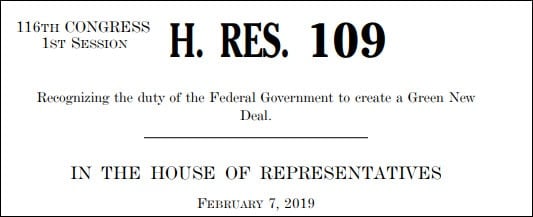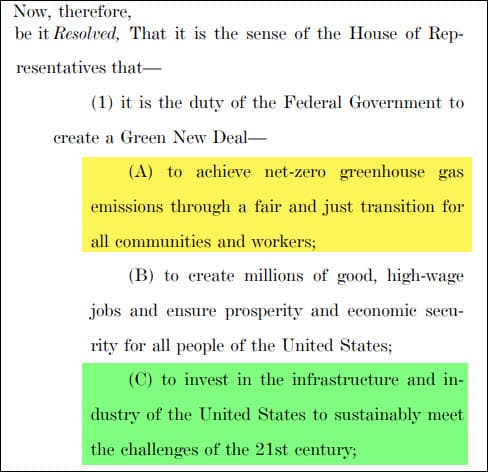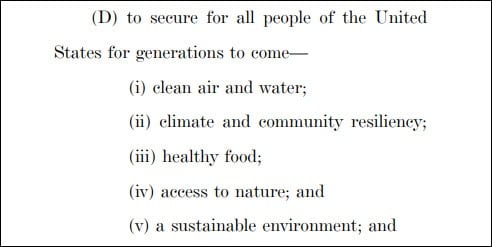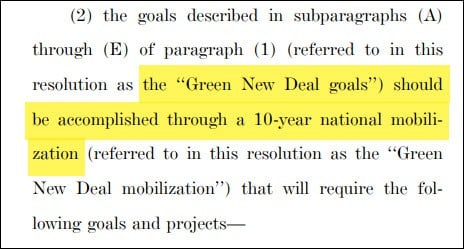The Green New Deal (GND) is important as a starting point to have a long, long overdue conversation about energy. Specifically: How are we going to eventually transition away from fossil fuels?
As such, the proposal -- while (very) far from perfect -- should not be ignored and deserves our attention.
It's also important because it represents the sorts of zig-zags our social and political paths are inceasingly likely to take in the coming future as we're forced to face our looming economic, ecological and energy-related predicaments.
A Symptom Of A Global Disease
The GND is emblematic of the same pressures that brought about the election of Trump, the Yellow Vests in France, Brexit in the UK, the Catalonia breakaway in Spain, the rise of populism in Italy, and the fracturing of the Middle East.
Growing numbers of people are beginning to understand that the outbreak of these social movements share a common cause: the loss of sufficient economic growth to fund both the upper and lower stratas of society.
There simply isn’t enough "growth" left for everyone to share in it. Surplus economic production requires surplus net energy. As we've been chronicaling for years, there’s now less and less of that to go around.
And because the wealthy won the class war a long time ago, anemic economic growth combined with a bought-and-piad for political system translates into less and less for the many and more and more for the few.
That is an explosive mix. Eventually it will prove to be the end of ‘good old days’ unless it is self-corrected extremely soon -- though don't hold your breath. There are precious few historical examples of the wealthy figuring out in time that they’ve gone too far, assumed too much, and shared too little:
People of privilege will always risk their complete destruction rather than surrender any material part of their advantage.
Intellectual myopia, often called stupidity, is no doubt a reason. But the privileged also feel that their privileges, however egregious they may seem to others, are a solemn, basic, God-given right.
John Kenneth Galbraith – in The Age of Uncertainty
Given that backdrop, we're interested in the GND as an indicator of where we are in the great swinging of the socio-political pendulum.
FYI: there's already been some excellent discussion on the proposal in the Peak Prosperity forums, which is definitely worth checking out as accompanying reading to this article.
What Exactly Is The "Green New Deal"?
Here’s the skinny. The GND was introduced on February 7th, 2019 with 64 House Democrat and 9 Senate Democrat cosponsors.

From it’s accompanying fact sheet, the resolution is “a 10-year plan to mobilize every aspect of American society at a scale not seen since World War 2 to achieve net-zero greenhouse gas emissions and create economic prosperity for all.”
So far so good. While we don’t think 10 years is anywhere close to a workable time frame -- it’s much too fast to get to ‘net zero’ emissions (meaning planes and cows are still emitting, for example, but new farming practices are absorbing an equal amount) -- we completely agree with the idea that it’s so late in the game that we need something like the mass mobilization of effort seen in WW II. Only it might need to be that large, plus an Apollo mission, and a Manhattan project in order to succeed.
Here’s the language in the bill:

In (A) it's not clear what a ‘just and fair transition’ means for all communities and workers. There will be winners and losers as there are in any massive economic transformation. Some jobs won’t make sense in an energy-transformed future, and neither will some far-flung communities. This sort of vagueness of meaning, let alone intent, makes the proposal hard to assess in terms of cost, scalability or political feasibility.
We’ll get to the massive issues involved in an energy transition shortly (and they are legendary.) But, first let’s get through the rest of the bill.
Section (B) leaves us really scratching our heads as we’re a big believer in jobs but we’re really not fans of the idea of government providing make-work just for the sake of keeping people busy. And we're definitely opposed to the concept of "giveaway money" aka Universal Basic Income. As the accompanying fact sheet says, part of the envisioned deal is to provide “economic security for all who are unable or unwilling to work.” The emphasis is mine, but the idea of providing economic security for those unwilling to work strikes us as a particularly bad idea. Of course, we're against corporate handouts and bank bailouts, too. [Edit note inserted on 3-11-19: The Ocasio-Cortez team has since said these FAQs were "bad copy" and released by "mistake" and deleted from the website. No retraction or clarification has yet been issued]
In (C), above, we at Peak Prosperity are in strong agreement with the principle of investing in infrastructure, as well as sustainably meeting the challenges of the 21st century. But lacking any more detail than that, there’s not much more to say besides “we think we support this!” But we’re not actually sure. Also, it’s not really the “duty” of the federal government to invest in industry, as that’s really not its strong point.
But, with a gun to our heads, if you asked us if we’d rather see the next $1 trillion of government dollars flow into bank bailouts or into infrastructure, we’d pick the latter in a skinny minute.
Here's the next paragraph:

To which we reply yes, yes, yes, yes, and yes. Put us down for all of that. And also, motherhood and apple pie. And puppies.
Again, the devil will be in the details. And, again, there are none to be found here (yet). Just fine and worthy aspirations.
How exactly the government will go about assuring any of these things is unknown at this point. For sure, it will require a lot of healthy debate and planning.
Still, to recognize progress, just seeing such values put in print at the federal level is a welcome development. This can be taken as a good sign if it truly means we are finally beginning to invite proper national discussion about the essentials that actually matter to us and future generations.
Reading on, we get to the proposd time frame. This is where we start to raise concerns – ten years just doesn't seem realistic:

They're proposing to accomplish all this in the next 10 years (here we summarize the next 15 major sections of the bill):
- Build resiliency against climate related disasters
- Repair and upgrade infrastructure in the US
- Meet 100% of power demand in the US (not just electricity, but all power)
- Build a nationwide smart grid
- Upgrade all existing buildings to maximum energy efficiency
- Spur massive growth in clean manufacturing
- Remove pollution and greenhouse gas emissions from agriculture
- Overhaul all transportation systems in the US
- Restore fragile and threatened ecosystems
- Remove CO2 from the atmosphere through a variety of means including carbon capture and storage
- Clean up hazardous waste sites
Don't get me wrong -- we agree that those are worthy and wonderful goals. Many of them are essential to our future well-being.
Any one of them would be a tall order to complete with the next decade. But all of these?
And how much will all this cost? That's completely "TBD" at present. Costs are not estimated or enumerated anywhere in the GND document.
And whatever the cost, how will this ambitious set of programs be funded? Apparently the Fed will just print up most of the money (again from the fact sheet addressing the question “How will you pay for it?”):
The same way we paid for the New Deal, the 2008 bank bailout and extended quantitative easing programs. The same way we paid for World War II and all our current wars. The Federal Reserve can extend credit to power these projects and investments and new public banks can be created to extend credit.
There is also space for the government to take an equity stake in projects to get a return on investment. At the end of the day, this is an investment in our economy that should grow our wealth as a nation, so the question isn’t how will we pay for it, but what will we do with our new shared prosperity.
Not to be overly cynical, but “this baby will pay for itself!” is not the strongest of arguments for the sponsoring politicians to make as history is extremely clear that those claims very rarely pan out.
Going further and wondering about how we will even manage to share all of the resulting prosperity diminishes the argument even further for me. It sounds ungrounded, magically-thinking even, especially since no costs have even been calculated. In our experience, faith-based “investments” are the worst investments.
However, we can clearly see the influence of the 'new darling of modern economics', Modern Monetary Theory (MMT), here. Simply put, it's the idea that the government can simply inject new money into the economy with far more benefit than negative consequence.
We’re entirely unconvinced by this argument. On monetary terms, but even more so because it assumes resources (such as ever more oil) into existence.
MMT assumes that money is the real substance around which everything else revolves. We hold an exactly backwards view from that. In our view, money is just a claim, a marker. What's real is everything else -- everything that money is a claim on (ore, timber, soil, livestock, etc). You can't instantly conjure more of this stuff into existence, no matter how many new dollars you print.
In the context of the GND, we need to point out that many of the bullet points in the above list are multi-trillion-dollar expenditures each.
To simply get US infrastructure up to first world standards would require $4.5 trillion according to the American Society of Civil Engineers (ASCE).
A smart grid? More trillions. Carbon Capture and storage? Many billions maybe trillions. We don’t know at this point because the required technology and processes are not yet scaled up.
But the biggest challenge of them all is weaning off of fossil fuels. That’s going to be many trillions if not tens of trillions of dollars. This includes abandoning stranded investments, taking their value down to $0 (the list includes every oil drill rig, all vehicles with internal combustion engines, exurbs that no longer make sense) and it includes rebuilding/replacing everything that currently uses or runs on fossil fuels – which is pretty much everything. Literally, just everything in your life is powered by, transported by and/or manufactured from fossil fuels.
Transitioning from fossil fuels will be a monumental challenge; a really tricky, complex operation -- if it’s even possible to do without crashing the economy, or worse. Converting to lower-density energy sources (which renewables are) is going to be both profoundly expensive and economically difficult.
Once we dig past the feel-good headlines about wind and solar, a host of complications are revealed. You don’t have to work particularly hard to unearth them, the details are well-known and easy to find.
For example, here’s a link to an excellent piece on the subject written by Michael Shellenberger, a once-committed alternative energy advocate who, after many years of front-line experience, has since come to believe that wind and solar are not really viable options to replace fossil fuels.
The sun doesn’t always shine, the wind doesn’t always blow, we don’t have the requisite grid-scale battery storage even close to worked out, dams have other claims on when and how their water is released that are equally compelling, wind towers kill enormous numbers of large birds and bats, solar panels create enormous amounts of waste at both ends of their life cycle, and on and on.
To spend any time seriously considering how to replace the wonderful, easy abundance of high net energy oil, coal and natural gas is to come away gawking at the sheer complexity of the task.
Yet we at Peak Prosperity are in agreement: it has to be done.
One way or the other, we will end up abandoning fossil fuels, either by environmental necessity or because the remaining dregs take too much effort to extract to make it worth the while.
If we're able to transition on our terms, a reasonable future is possible. If we wait until the limits to growth force our hand, the results will lie somewhere between miserable and utterly disastrous.
And that’s why the GND is a needed starting point for the conversation. Despite being woefully incomplete/unrealistic in its details.
The conversation about intelligently transitioning away from our doomed status quo has to begin somewhere.
We're seeing the seed of it sprouting with the striking students of Europe, Brexit, the Yellow Vests and all of the other suddenly emergent expressions of people rising up and saying “Something is very wrong here! We need to switch to a better way of doing things.”
What's Undeniable Is That Action Is Needed
The Green New Deal suffers from being a gigantic grab-bag of mixed proposals that will have to be separated into individual, much more clarifed components if they are to be actually tackled.
Job security, remedying social injustice, a massive infrastructure overhaul, carbon capture, smart grids, revamping transportation -- each is a massive undertaking.
But none more so than energy transition. Our view at Peak Prosperity is that each nation on Earth is in urgent and critcal need of addressing this question: “Where do we want to be when fossil fuels run out and how do we want to get there?”
This really is the single greatest challenge society faces today, far eclipsing the many other contenders. Simple put: our species has fully expanded into its available energy source, and now we need to figure out how we’re going to transition into whatever's next.
The US had its wake-up call back in the 1970’s when then-President Jimmy Carter laid down a reasonable set of intelligent responses that we’d have done well to heed and implement. But we didn't. Instead the business-as-usual crowd won out and many decades were frittered away, while we continued the build-out of unsustainable living and working arrangements that will be hideously expensive to retrofit or replace.
But that’s all in the past. We are where we are.
So, what are we going to do about it now?
In Part 2: Requirements For Any Kind Of Credible "New Deal", we put forth our own proposal of the policy measures that we at Peak Prosperity deem essential at this pivotal point in history.
Yes, we need to think big to address the massive challenges we're facing; but we also need to think practically and logistically. What are the most effective and achievable ways to affordably secure the best possible future for ourselves, our progeny and our planet?
Our mission statement here at Peak Prosperity remains the same it's ever been: To create a world worth inheriting. If you share that goal, join our tribe of conscientious truth seekers trying to make a difference -- and if you have good ideas to contribute -- add your input to our proposal.
Click here to read Part 2 of this report (free executive summary, enrollment required for full access).
This is a companion discussion topic for the original entry at https://peakprosperity.com/deconstructing-the-green-new-deal/